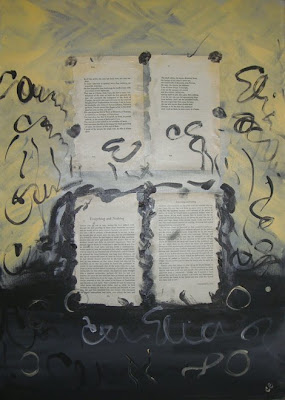FAITHFUL FRAGMENTS
I said that I wasn’t going to write about Horace, but for some reason I keep returning either to books he gave me (esp. one on ruins) or to the ones he wrote himself. In his essay on Gunnar Björling, “Din Tavshed Lydende,” I read about the similarity, but at the same time also dissimilarity between Björling’s thought and that of Hegel. For Hegel, as Horace has it, history is reason’s struggle with itself, while the soul or spirit (the geist) ruins all its forms, one after the other, in order to reach a higher stage of development. For Björling, it makes little sense to talk about reason in opposition to boundlessness, as the boundlessness of existence is at the same time also its non-reason. Therefore, says Horace, “the detail is more genuine (truthful) than the whole, and the fragment a manifestation of faithfulness to infinity.” The argument is that the articulation of ideas within this faithfulness must remain a silent expression, which in Björling’s thought it does. Says Horace in his final paragraph: “To listen to voice does not imply “understanding” this impossibility to say things, for how is one to be able to follow a thought which cannot be formulated? By taking it as a touch. Björling, by letting voice become a zone of proximity between you and I, unveils the themes of silence as figures of longing for love. The unsaid said is thus both the place of magic and of vulnerability. There time loses its dividing power, the dead join in, and the child is reborn in unfathomable innocence. Logically, this happens concomitantly with the world of enunciations: in desire, of negations and paradoxes, of dreams” (Berøringens ABC, 131-136; my translation).




Comments
& shared the brilliant ideas!!!
Love,
BonBob